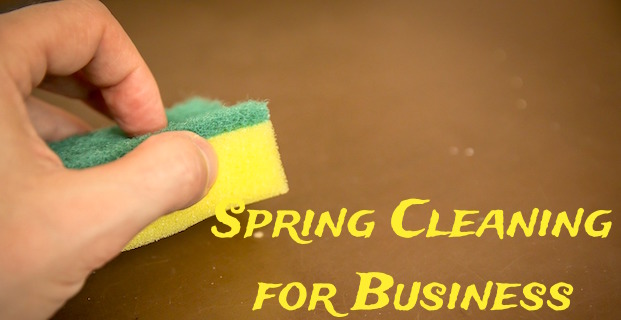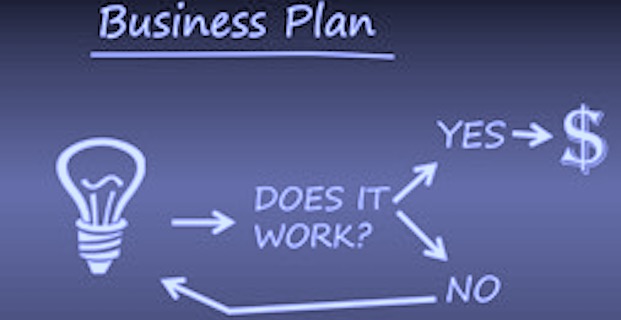by Elle Ray | Apr 22, 2019 | Small Business Advice
A Clean Space Helps Recharge Your Batteries

You take your winter clothes out of the front closet, bring coats to the dry cleaners and sort out your spring and summer wardrobe. The house gets a thorough spring cleaning and you clear all the winter debris from your yard to prepare for new growth.
Spring cleaning is a rite of passage for those who love the freshness that the new season brings. And while you may take painstaking care of your home, have you spent an equal amount of time and energy giving your office and your business its share of attention? If you’re like most busy entrepreneurs, the answer often is “No.”
Clean Up and Breathe
One of the reasons that spring cleaning is a vital annual ritual is that it gives you the opportunity to rid your home of moldy spores that have been waiting for the temperatures to rise so they can be fruitful and multiply. Your office, where you spend so much of your time, needs the same disinfecting as your home.
So while you’re cleaning the walls and baseboards of your office as part of a yearly spring cleaning, don’t forget to sanitize your:
- Keyboard and mouse, where the winter’s germs have surely found a place to settle
- Bookshelves, where dust mites love to congregate behind the tomes and knick-knacks
- Desk and all that’s accumulated there while you worked so hard all winter
- Chair, on which you sat for endless hours, catching up and paying your dues while you waited for warmer weather to get you outdoors
Spring Cleaning for Windows
Don’t forget about the inside of your computer! That doesn’t mean you necessarily have to take apart your case and give your hard drive a good scrubbing (although people have done that). Instead, consider your files and all that they contain.
When you get the spring cleaning bug, take it to the next level and clean up your cookies, junk files and other temporary files that just get in the way. For example:
- Go through your saved files and delete those items you’ll never need (or want) to look at again. Not only do useless files take up room on your hard drive, they add to the clutter that ends up slowing down your searches and ultimately, your mind. Sometimes, unneeded files take up time too, especially when you forget what’s in them and have to open them to trigger your memory.
- Use an external hard drive or even a thumb drive to store those files that you might need in the future. By keeping them out of your main memory, you clear up storage and still keep them nearby — just in case.
- Consider your client list and begin a purging process to get rid of those customers who aren’t adding sufficient benefits to your business or your bottom line. Spring cleaning is the ideal time to clear out from under those clients who are more pain than profit or who bring you down. One rotten strawberry can ruin the bushel; don’t let one negative client ruin the fun you’re having with your business.
Spruce Up for Spring
Just as you cut fresh flowers to grace your table, bring in some freshness to your office environment. Paint the walls. Put some new artwork up. Exchange your old, tired motivational posters for some new, bright ideas.
Move your desk to give yourself a fresh perspective. If possible, set your chair toward a window (newly cleaned of course). It reduces glare on your computer screen and opens your view, which in turn may open your mind to new ideas.
Get more great ideas from our small business advice section of our blog. Contact us for more information.
by Mark Bloom | Apr 16, 2019 | Small Business Advice
Great Tips from a Content Writer’s Perspective
At Ray Access, we constantly tell our clients and our prospective clients:
“Your website should be making you money,
not costing you money.”

Most businesses, with the exception of ecommerce sites, likely view their website presence as an expense. It’s no wonder:
- Hiring staff (inside your firm or on contract) to manage and update your website can be costly every month.
- Search engine optimization (SEO) and other online marketing efforts also take away from your profits.
- Even hiring a reputable firm like ours to write your weekly blogs may feel prohibitive and too much of a cut on your bottom line.
What’s the point of these expenses if your site isn’t generating any income? You need staff to keep it fresh and SEO services to drive qualified traffic to it. But if none of those visitors are contacting you, you’re paying for eyeballs instead of wallets. You get more leads from your website when it appeals to those who land there. That is, after all, what your website is supposed to do!
Get More Leads from Your Website!
It doesn’t matter how many people view your website if it doesn’t generate any leads for your business from those visitors. And that’s where your site design and content play key roles. A persuasive design and engaging content that connects to your target audience can make the difference in convincing visitors to contact you for your products or services.
“If you’re ignoring your website,
your website is likely ignoring you.”

Websites, like most other marketing strategies, need to be constantly reviewed, tweaked and updated. Keep doing whatever seems to be working. Stop doing whatever’s not working and start doing something new. There are many ways to get more leads from your website, but it takes attention — either yours or someone else’s.
Tips from Professional Content Writers
To get more leads from your website, take heed of three common-sense tips:
- Direct your visitors to the information they’re seeking. This may seem easy at first glance, especially if your target market is singular and very well-defined. But many businesses (like ours) have multiple target markets. Use your website design to provide cues for specific audiences. Make it easy for them to find what they’re looking for, whether it’s information about your pricing, your industry or your business. Put your contact information on every web page. And finally, have the information they need to make a qualified decision available (and visible) on the page. Give them what they need, tell them why it’s important and point them to the solution.
- Make your message feel urgent. People naturally react to things that need immediate attention. Your message has to convey how important it is that your visitors act now. Now! Put time-sensitive material on the page. Explain why it can cost more (in time, consequences or money) if they delay. The more urgency you add to your messaging, the more likely your visitors will act — whether it’s to contact you, fill out a form or download a white paper. Give them a reason to contact you, and they are more likely to.
- Solve problems for your visitors. A classic strategy in marketing is to identify a relatable problem that your target audience is likely experiencing, and then offer to solve it. It’s not a bait-and-switch if you fulfill your promise. At this point, your website isn’t just selling your products and services; it’s helping your potential customers solve a problem.
In the end, to get more leads from your website, you have to give your visitors what they want and expect. If you can do that and make it easy for them to follow through, your website may become a treasure trove of potential customers. That’s the value of an effective website, and persuasive content can make your site effective. Contact Ray Access to jump-start your website.
by Mark Bloom | Apr 9, 2019 | Small Business Advice
The Ways to Market Your Business Are Many

While it sounds like faux advice from a character in a science fiction movie, there is actually a lot of wisdom in “There is no trying; there is only doing.” Especially when it comes to ways to market your business. You can sit down with a marketing guru and plan out your marketing attack. You can write a business plan that looks five years into the future. Ultimately, you have to stop planning and do something.
And when it comes to marketing your small business, all your planning may come to naught. There may be a flaw in your plan or a mistake in its execution. It may not even be your fault. But more marketing misses than hits. That is the honest truth.
Many Ways to Market Your Business
When it comes to ways to market your business, you have hundreds of options, from hiring a high school kid to stand on a street corner with a sign and a funny costume to hiring a firm to produce a commercial for the Super Bowl. It’s all marketing — and yes, advertising is a subset of marketing.
Other examples of marketing that may or may not work for your business include:
- Billboard ads
- Distributed flyers
- Search engine optimization
- Sponsoring events
- Auto wraps
- Pay-per-click online ads
- Contests
- Special sales events
- Blogging
- Radio spots
- Social media
- Giveaways
- Press releases
With so many choices — and there are many more — which do you try? How do you select the strategy that may work best for you? The answer may surprise you.
Lesson #1: There Is No Trying
Remember the title of this blog post: There Is No Trying; There Is Only Doing. No matter where you decide to start, no matter which strategy you decide to begin with, you must give it your best shot. Don’t hold back. If you can afford a billboard ad, ask yourself if you can afford two, in different parts of your city. Make them different and compare the return on investment for each.
Give your initial strategy time to succeed. While paid advertising (online or off) may yield immediate results, some strategies, like blogging or radio spots, may take time to penetrate to your audience. If you’re prepared to pour money into a marketing effort, make sure you have enough reserves to give it the time it needs to succeed.
Lesson #2: There Is Only Doing
But if your strategy isn’t working, stop doing it and move on to the next campaign. This advice may sound contradictory to Lesson #1, but it’s not. Because there are so many ways to market your business, you’d be foolish to pour everything into one option. Especially if it’s not bringing home the bacon.
If your billboard ads have only brought in one or two customers in six months, stop paying for it and put that money into a different marketing effort. If, after six months of promoting your well-written blog posts, no one even likes them, it’s time to try Plan B. Give a campaign time to succeed, but recognize when it’s just not working.
Know When to Do It Yourself … and When You Can’t
Planning your initial marketing campaign is an exciting time for your business. If you know your industry and your market — and how to reach them — then go for it yourself. Plan your strategy, unleash your attack and track the results. If that’s too ambitious for you or you just don’t have the time to devote to it, call in a marketing pro.
The same advice holds true for marketing campaigns that involve writing expertise. If you’re capable and can paint a marketing phrase like a master, go for it. Otherwise, we recommend hiring professional writers like those at Ray Access. We provide the means for marketing your business that have a better chance of succeeding.
Ray Access is a content marketing firm that delivers targeted words to empower your business. Contact us about your specific project to receive a quote or discuss your needs. We write website copy, blog posts, e-newsletters and more. Everything we do is thoroughly researched, professionally edited and guaranteed original.
by Elle Ray | Mar 26, 2019 | Small Business Advice
What Are the Pros and Cons of a Home Office?

There’s a lot to be said for going to work everyday in an office that someone else has to pay for. You can simply drop everything, shut it all down and leave it there when the clock strikes quitting time. And the camaraderie of an office setting is hard to replace. In fact, belonging is one of the five pillars of Maslow’s Hierarchy of Needs. Having a place to go to work is why many people go to work at all — to make friends and build social relationships.
According to a 2018 Forbes piece: “Strong social connections make people happier and physically healthier, which can translate into work performance.” This implies that those who work at home have a tendency to work less and even live unhealthy lives of desperation! Could it be true?
We Know Better
Whether you’re a freelance or contract worker — or your corporate boss has offered you remote access and the ability to work at home, you may find that it’s an ideal solution for your lifestyle. Maybe you already have enough friends and need some alone time to keep your sanity. For many who savor their work at home situation, the florescent lights, constant chatter and ringing phones are more of a distraction than a comforting atmosphere in which you can be productive.
As entrepreneurs and writers, the principals of Ray Access spend most of their time in isolation. They gave the office thing consideration, but the accountant said an emphatic “No.” One of the most important benefits for small business owners is the savings that comes with a home office. The tax write-offs are just as astute as if paying for a brick and mortar office space.

Work at Home Benefits to Beat the Band
To those workers who’ve done the work at home bit for a long time, the benefits far outweigh the disadvantages. Many could never return to an office shared with other people. They’re spoiled. In addition to saving a bundle on monthly bills, some of the most outstanding benefits of working from home include:
- Flexibility. Unless your keystrokes are monitored by your boss, you can get up when you want to, have lunch at any time, take a two-hour break and go work out, move your laptop outside, call a friend in the middle of the afternoon and just darn well work whenever you want. As long as you fulfill the tenets of your contract, you set your hours.
- Dress code. There is none! Big savings on wardrobe updates and dry cleaning.
- Family time. Removing a commute from your workday gives you an enormous chunk of time you can spend with your family. You can be there when the kids get home from school and return to work as they settle in. Make dinner for the gang and then work some more in the evening if you need to.
- Health. While some people need the discipline and socialization found in a workplace to be mentally healthy, when you work at home, you have a much better chance of eating more healthfully. It’s just as easy to throw together a salad for lunch than to go out to get a burger and fries. And back to that mid-day or early morning workout: you don’t even have to shower when you get back home. It’s just you in the office!
- Less meeting time. Even if you do have to sign in for the daily office meeting electronically, you can always mute your end and turn up the radio. Entrepreneurs who work at home set meetings at coffee shops on their schedules. Just remember that meeting clients means you have to put on some decent clothes. But at least you can write off the coffee.
Ray Access is a content marketing firm that delivers targeted words to empower your business. Contact us about your specific project to receive a quote or discuss your needs. We write website copy, blog posts, e-newsletters and more. Everything we do is thoroughly researched, professionally edited and guaranteed original.
by Mark Bloom | Mar 5, 2019 | Small Business Advice
Make Your Site More Effective for Your Business

Every business wants a successful website. Every successful website draws people in, encourages contact and generates leads. In other words, every website is a potential source of new customers, an opportunity for you to make your pitch and a chance to educate your customers.
A poor website isn’t just a missed opportunity, it actually can hurt your business, since potential customers can click away to find your competition. Don’t let that happen to you. A great website is another tool in your marketing toolbox. It’s one more way to connect to your target audience.
Ray Access, with experience researching and crafting highly effective websites, has put together a list of five ways you can improve your website. And these are things you can do as soon as today.
1. Assess Your Website
To improve your website, you first have to know what works and what doesn’t. That’s just common sense. To move forward, you first have to know where you are. You can hire consultants to come in to do a months-long study of your site. They’ll track page hits and how long visitors spend on each page. It will likely cost you thousands of dollars to point out things you may already know, or at least suspect.
Or you can hire Ray Access to do a website assessment. An assessment is a page-by-page review of your site from a visitor’s point of view. In other words, it inspects the user experience (UX) of your site. The report includes design, content, usability, navigation and presentation. What works? What’s missing? What can make it better? It’s all in a website assessment.
2. Upgrade the Technology
According to Forbes Magazine, your site needs to be fast, safe and mobile-friendly. All three factors are vitally important to ranking your website high and providing a positive user experience. You may need help accomplishing these goals, but they will make a difference in how your site is perceived.
Since the internet is all technology, improve your website by upgrading the technology. To the point:
- Speed helps your website load faster. Making anyone wait for your site to load is essentially putting up a wall between your site and your visitors. Speeding up your site encourages visitors to stay.
- Safety has become a primary issue, especially if you’re taking credit card or other personal information. At the very least, your site should have secure sockets layer (SSL) enabled.
- Mobile-friendly sites don’t just render more seamlessly on smaller connected devices, but they rank better in Google searches. Don’t fall behind the curve; improve your website by making sure it’s mobile-friendly.
3. Add Testimonials
With the advent of pay-per-click campaigns, there have been many studies on what makes a successful landing page — the page the ad sends you to. It doesn’t have to be your home page. In fact, it’s better if it’s a targeted page made especially for that ad. And one of the most successful components of good landing pages is “social proof.”
Social proof is basically testimonials on the page from previous customers. But they must be believable, and the best way to ensure believability is to put a real name, a real quote and a real photo of your customers on your website. Visitors like to see that others have used your products or services to do what they need. It’s a powerful tool to improve your website’s marketing power.
4. Start a Blog
A blog gives you a weekly opportunity to educate your customers and potential customers about your industry, your business, about you or about almost anything that relates. You can even tap into current events as a way to lure visitors to your site. Your blog is a marketing tool to capture more views and more viewers.
A blog also has the advantage of adding volume to your website. More and more articles related to what you do, how you do it and why you’re the best add up to more persuasive content for creating leads and generating more business. And the content in your blog posts can be reused a number of ways:
- In advertisements
- In newsletters
- In marketing collateral
- In press releases
5. Update Your Messaging
Regardless what kind of search engine optimization (SEO) you’re running — or the volume of social media campaigns, every interaction with your audience should encourage them to click through to your website. It’s your website’s job to convert visitors into customers. It’s up to your website messaging to win over new fans.
If your site is getting lots of traffic, but few sales, improve your website by changing your messaging. Maybe you need more persuasive content. Maybe you should revise your pitch. Maybe the language on your site doesn’t connect with your potential customers. Maybe you need more calls to action to give your visitors a direction. Whatever you need, call on Ray Access to deliver expert content for you.
Ray Access is a content marketing firm that delivers targeted words to empower your business. Contact us about your specific project to receive a quote or discuss your needs. We write website copy, blog posts, e-newsletters and more. Everything we do is thoroughly researched, professionally edited and guaranteed original.
by Elle Ray | Feb 25, 2019 | Small Business Advice
Getting a Degree Is the Million-Dollar Question

Some of the world’s most successful business people never had a small business degree (or any college degree) when they first started out. Bill Gates stands as a classic example. He’s often touted as the world’s most successful college dropout. Also consider Rachel Ray, Russell Simmons, Michael Dell and Mark Zuckerburg. They all belong to the illustrious crowd of “uneducated” superstars.
And yet, so many budding entrepreneurs hesitate to take the plunge because they feel the need to get a small business degree. They look to higher education to teach them about:
- Accounting, so they can do their own books
- Advertising, to learn how to sell their products and services
- Web development, so they can build their own websites
- Contract law, so they don’t get taken
- Marketing, to learn how to research competitors and identify a niche
- Human resources, so they can hire, train and manage a staff
- Management, to be able to manage said staff
- Leadership, so they can guide their venture
- Writing, so they can create their own proprietary copy
Pick Your Poison
Sure, there are plenty of institutions ready to take your money and give you that small business degree before you ever even earn a nickel in profits. A recent Google search for “small business degrees” turned up 443 million hits. And each has developed its own pitch as to how they’ll make you a better entrepreneur.
In 2019, however, it’s not the sheepskin hanging on the wall that impresses customers. It’s the quality of your products and services. It’s not how savvy your ads are that bring in the business. It’s how passionate you are about your brand. And clients don’t really care if you’re a Quickbooks pro or rely on a handwritten ledger to keep track of your money; they just care about getting a good deal.
The Entrepreneur Defined

A small business degree doesn’t make you a bona fide entrepreneur. While a doctor is defined by credentials, an entrepreneur, as defined by Dictionary.com is: “a person who organizes and manages any enterprise, especially a business, usually with considerable initiative and risk.”
Some say that entrepreneurs are born, not made. Did you have a lemonade stand or cut the neighbor’s grass as a kid? Did you arrange for a band at your high school graduation or champion great photos for the yearbook? Have you ever sold candy to go to camp or figured out how to get a bigger allowance from your parents? If you answered yes to any of those questions, chances are you have entrepreneurial blood running through your veins.
Find a Need and Fill It
Entrepreneurs just do it. Even the founder of Nike that made the slogan famous didn’t have a small business degree. He was a track and field coach looking for better shoes for his runners. The important traits and skills needed by successful entrepreneurs can’t be taught in a classroom. Not even in virtual classrooms.
No small business degree can provide you with energy and optimism you need either. Entrepreneurs tap that well from deep within. They watch other successful startup pioneers. They learn from trial and error. For all those other tasks — you can hire someone to do them.
Ray Access is a content marketing firm that delivers targeted words to empower your business. Contact us about your specific project to receive a quote or discuss your needs. We write website copy, blog posts, e-newsletters and more. Everything we do is thoroughly researched, professionally edited and guaranteed original.









